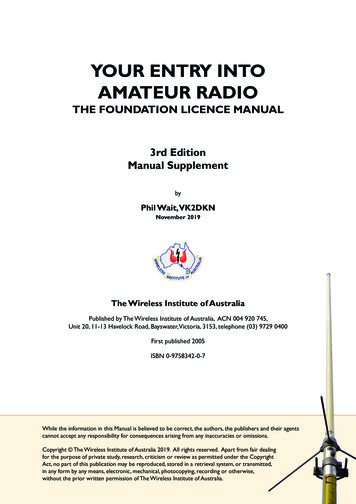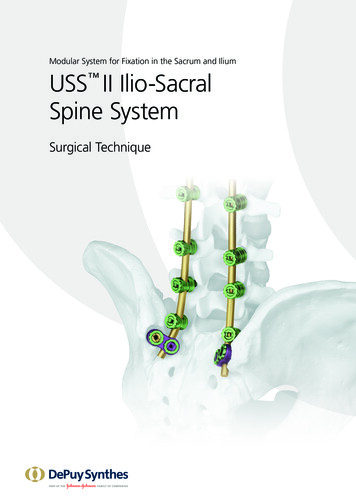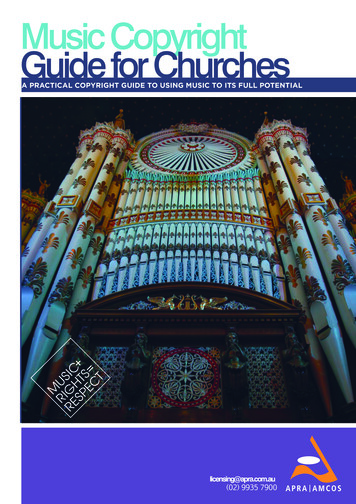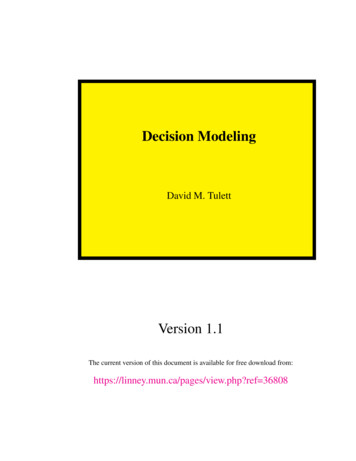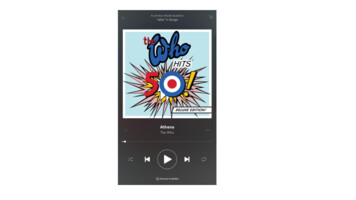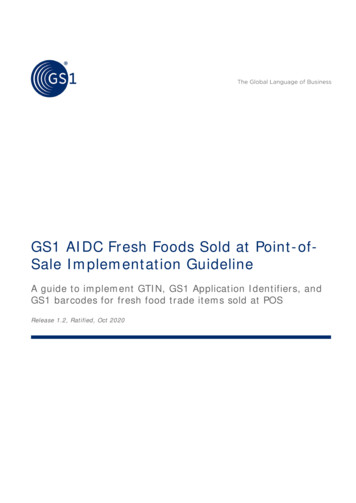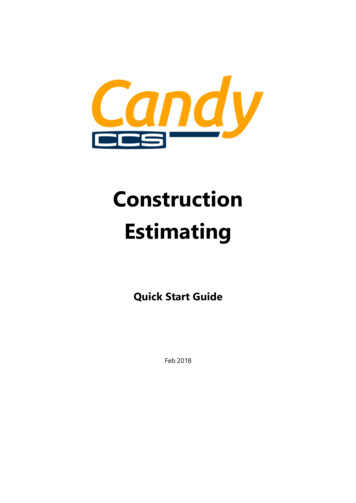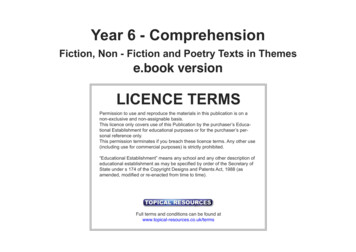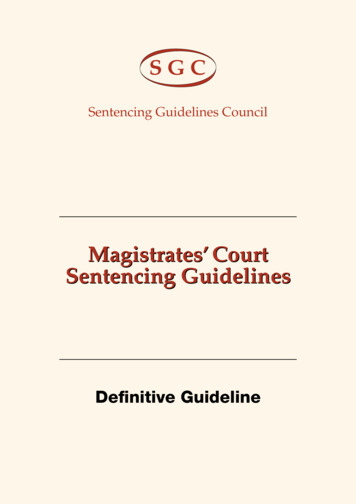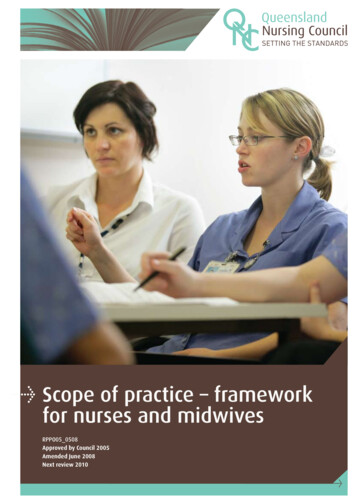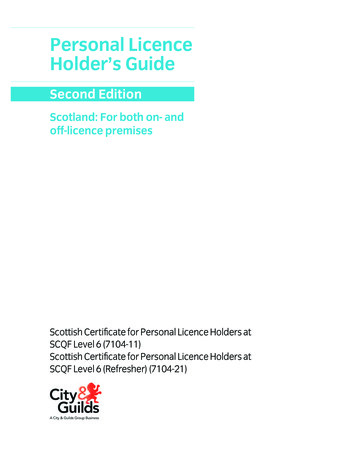
Transcription
Personal LicenceHolder’s GuideSecond EditionScotland: For both on- andoff-licence premisesScottish Certificate for Personal Licence Holders atSCQF Level 6 (7104-11)Scottish Certificate for Personal Licence Holders atSCQF Level 6 (Refresher) (7104-21)PLHG 2e.indb 122-Sep-17 8:33:03 AM
About City & GuildsCity & Guilds is the UK’s leading provider ofvocational qualifications, offering over 500awards across a wide range of industries, andprogressing from entry level to the highestlevels of professional achievement. With over8500 centres in 100 countries, City & Guildsis recognised by employers worldwide forproviding qualifications that offer proof of theskills they need to get the job done.About Alcohol Focus ScotlandAlcohol Focus Scotland is Scotland’s nationalalcohol charity working to reduce the harmcaused by alcohol. Alcohol Focus Scotlandprovides training for people working at alllevels within the licensed trade in Scotland.All courses meet the necessary legislativerequirements.0141 572 ohol-focus-scotland.org.ukEqual opportunitiesCity & Guilds fully supports the principle ofequal opportunities and we are committedto satisfying this principle in all our activitiesand published material. A copy of our equalopportunities policy statement is available onthe City & Guilds website.CopyrightThe content of this document is, unlessotherwise indicated, The City and Guilds ofLondon Institute 2014 and may not be copied,reproduced or distributed without prior writtenconsent.First edition published 2007Second edition published 2014Reprinted 2014 (three times), 2015, 2017 (twice)Publisher: Fiona McGladeDevelopment Editor: Frankie JonesProduction Editor: Lauren HeaneyCover and book design by Purpose LtdTypeset by Saxon Graphics LtdPrinted in Croatia by ZrinskiBritish Library Cataloguing in PublicationDataA catalogue record is available from the BritishLibrary.PublicationsFor information about or to order City & Guildssupport materials, contact 0844 534 0000 orcentresupport@cityandguilds.com. You canfind more information about the materials wehave available at y effort has been made to ensure that theinformation contained in this publication istrue and correct at the time of going to press.However, City & Guilds’ products and servicesare subject to continuous development andimprovement and the right is reserved tochange products and services from time totime. City & Guilds cannot accept liabilityfor loss or damage arising from the use ofinformation in this publication.City & Guilds1 Giltspur StreetLondon EC1A 9DD0844 543 dguilds.comISBN 978-0-85193-300-9PLHG 2e.indb 222-Sep-17 8:33:03 AM
ContentsPLHG 2e.indb 3Introduction to using this book41 Licensing law72 Other key legislation393 Alcohol554 Managing the premises andpeople79Useful resources111Test practice answers118Acknowledgements11922-Sep-17 8:33:03 AM
4Personal Licence Holder’s GuideIntroduction to using this bookThis book is written as a guide for those who are seeking to gain their ScottishCertificate for Personal Licence Holders at SCQF Level 6 (7104-11) and theScottish Certificate for Personal Licence Holders (Refresher) at SCQF Level6 (7104-21) qualifications under the Licensing (Scotland) Act 2005. It coversboth on-licence and off-licence premises.It contains all the required content for the Personal Licence Holder andRefresher qualifications, plus additional material that may be useful to you inthe management of your premises.You can use this book in a number of different ways:rr You are expected to read it before attending a training session. Please notethe Refresher course will not cover all of the topics that you may be tested on.rr It is a good idea to have the book with you in the training session. You canrefer to it as needed, and it’s a good place to make any notes so they’re athand for future reference.rr It is also recommended that you re-read the book after taking yourqualification with a view to seeing if you need to make any changes at yourpremises.We hope that you will find this book interesting and useful.The exams for the Personal Licence Holder (PLH) and Refresher qualificationsare slightly different. The following table explains these differences.TopicNumber ofquestionsin the PLHexamNumber ofquestionsin theRefresherexamIntroduction00The importance of the Act and therelationship between licensing andhealthOverview of the licensingfunctionThe five licensing objectivesThe meaning of alcoholBroad understanding of what licensinglegislation coversPLHG 2e.indb 4Pagereference*9119571022-Sep-17 8:33:04 AM
Key roles2Licensing Boards, their role and policyLicensing Standards OfficersOther statutory bodiesLocal Licensing Forums, their role andmembershipLicensing and operatingconditions141712, 13, 2513, 19, 20,22–2426–2734, 41–4216, 182529–30, 31,32–3322–2313–1620–21Application process for personal licenceApplication process for premises licenceVariation and transfer of premiseslicenceDuties of a personal licence holderRights of objectorsRelationship between operating plan andpremises licence, including variations22, 2414, 2114, 2066Sale, purchase, consumption of alcoholby under-18s; sales by under-18sProof of ageTest purchasingControl of orderThe law, drunkenness and disorderlyconductIrresponsible promotionsExclusion orders; review of premisesand personal licences and sanctions,closure ordersPowers of entrySocial responsibility levyPLHG 2e.indb 5510–1112–13, 3214, 3211–12Personal, premises and occasionallicencesDifferences between premises andpersonal licence holders and premisesmanagersLicensed hoursRisk assessment and best practiceNational and local conditionsExemptions for members’ clubsRelevant offencesProtecting children from harmIntroduction129–30283044311921, 24, 32–333233*22-Sep-17 8:33:04 AM
6Personal Licence Holder’s GuideTraining11Requirement for training for licenceholders and staffTraining recordsAssociated law22, 2727–2810Effect of irresponsible operation 6on society and health6Minimum pricingUnits of alcoholPhysical and psychological effects ofalcoholGuidelines for low-risk drinkingDispelling myths about alcoholDifference between blood alcoholconcentration and drunkennessConsequences of excessive drinking tothe individual, business and societyCommon patterns of alcoholconsumption and misuse in ScotlandIllegal 63, 67, 6910100–102Common patterns of drug consumptionSocial responsibility44Best practice in setting and maintaininggood standards of service andenvironmentCommon causes of conflict, how toprevent and manage itSecurity procedures in relation to crimeand counter-terrorismPromoting recommended low-riskguidelinesCommunity linksUnderstanding links to communityinitiatives, ADPs, Community SafetyPartnerships, Pubwatch, Retail 720074, 105–106** Not to be tested.PLHG 2e.indb 622-Sep-17 8:33:04 AM
Licensing lawPLHG 2e.indb 71722-Sep-17 8:33:04 AM
8Personal Licence Holder’s GuidePLHG 2e.indb 8Licensing lawKnow your rights and responsibilities9Licensing (Scotland) Act 20059Licensing officials10Premises licence13Personal licence22Other types of licence25Members’ clubs25Licensed hours26Staff training27Protecting children from harm28Offences relating to under-18s29Other offences31Vicarious liability and due diligence32Further areas of law32Safeguarding your licence33Self check35Test practice3622-Sep-17 8:33:04 AM
Know your rights and responsibilitiesLicensing law9One of the licence holder’s biggest responsibilities is to ensure that alcohol isbeing sold responsibly and within the law. That means knowing who you canlegally sell alcohol to, under what circumstances you can sell it, and who youmust refuse to sell to.Legally, as a licence holder, you are at liberty to refuse to serve anyone.This part of the book sums up the key things you need to know about yourresponsibilities – and your rights – under the Licensing (Scotland) Act 2005.Licensing (Scotland) Act 2005The purpose of liquor licensing is to regulate the sale of alcohol in order tominimise harm.Scotland has a relatively new Licensing Act – it only came into force inSeptember 2009. When the old law was being reviewed, the NicholsonCommittee set up to do this was given the following terms of reference:rr to review all aspects of liquor licensing law and practice in Scotland, withparticular reference to the implications for health and public orderrr to recommend changes in the public interest, and to report accordingly.The Nicholson Committee’s recommendations led to the Licensing (Scotland)Act 2005. We can see that from its very beginning our legislative system isfocused on health and public order. The Act sets out five high-level ‘licensingobjectives’. All have equal weighting and decisions about licensing must bemade with reference to these five objectives:12345PLHG 2e.indb 9preventing crime and disordersecuring public safetypreventing public nuisanceprotecting and improving public healthprotecting children and young persons from harm.Did you know?The law will change inthe future to amend“Protecting childrenfrom harm” to includeyoung people, but atthe time of writing theGovernment has not saidwhen this will happen.22-Sep-17 8:33:04 AM
10Personal Licence Holder’s GuideFurther amendments to licensing legislation were made by the CriminalJustice and Licensing (Scotland) Act 2010 and the Alcohol etc. (Scotland) Act2010 and the Air and Weapons and Licensing (Scotland) Act 2015. Thesechanges have been included in this guide. Information about changes thathave not yet come into effect are included in blue text at the side.In the Act ‘alcohol’ means spirits, wines, beer, cider or any other fermented,distilled or spirituous liquor over 0.5% ABV. It doesn’t cover alcohol 0.5% orless, alcohol contained in a medicinal product or liqueur confectionery. (Formore details, and a full list of what isn’t covered, see Part 3 ‘Alcohol’.)The Act makes provision for regulating the sale of alcohol, regulating licensedpremises and other premises where alcohol is sold, and for connectedpurposes. It covers all liquor licensing matters including the licensingobjectives, licensing bodies and officers; licensing of premises and peopleto sell alcohol; licensed hours, control of order and offences on licensedpremises; conditions that apply to premises and control of irresponsiblealcohol promotions; and training requirements. It is a ‘dual licensing system’,meaning both the premises and the person must be licensed.Licensing officialsThe Licensing BoardThere is one Licensing Board for each council area, or division of a councilarea. The local council elects members to the Board from among its councilmembers, or councillors. The Board must have between 5 and 10 members –each council decides the number it needs. Members will elect a chair, knownas the convener. A Clerk, who must be a solicitor or advocate, is appointed bythe council and is responsible for providing legal advice to the Board. Boardmembers must gain a training qualification (one day’s training plus an exam).Licensing Boards have powers under the Licensing Act to determine whetheror not to grant licence applications. This includes premises licences andvariations, personal licences and renewals, and occasional licences.The Licensing Board hears any review of an existing premises or personallicence and decides what action should be taken. In carrying out theirfunctions, Licensing Boards must seek to uphold the five licensing objectives.The Licensing Board must hold meetings in public, which need to bepublicised well in advance. The Board is allowed to delegate certain decisionsto one or more of the following:PLHG 2e.indb 1022-Sep-17 8:33:04 AM
rr a sub-committeerr a single Board memberrr the Clerkrr a member of the Clerk’s staff.These decisions include the granting of occasional licences and personallicences or renewals where there are no offences or objections, and minorvariations of a premises licence.Each Licensing Board must write a statement of its policy, to be publishedwithin 18 months of the council election, and the Board can addsupplementary statements. They must consult with the Local LicensingForum, the Health Board and others. The policy:rr must seek to promote the licensing objectivesrr can give a general approach to the making of licensing decisionsrr should give guidance on the hours that are likely to be granted to typesof premisesrr must include a statement as to whether there is overprovision of licensedpremises, or a particular type of licensed premises, in any locality.Each Licensing Board must also keep a publicly available register, the‘licensing register’, which shows full information about all licences and anydecisions the Board has made regarding them.The Local Licensing ForumEach local council must establish a Local Licensing Forum for its area ordivision. The functions of the Local Licensing Forum are to:rr review the operation of the Licensing (Scotland) Act 2005 and how theLicensing Board operates in that arearr review the exercise of the local Licensing Board’s functionsrr give advice and make recommendations to the Board.Licensing law11Did you know?Recent changes tolegislation mean thatLicensing boards alsohave a duty to preparetwo annual reports;a financial report inrespect of their licensingactivities, and a functionsreport explaining howthey have had regard tothe licensing objectivesand their licensing policystatement. The firstfinancial report is duein 2017. The functionsreport requirement hasnot yet commenced, andis anticipated in 2018.Did you know?When determining ifthere is overprovision,the Board must consultthe licensed trade,residents, the HealthBoard and police.However, the Forum cannot make recommendations on any particularcase. The Licensing Board must have regard to the advice of the Forum andthey must give reasons if they choose not to follow it. The Board must alsoprovide statistical information to the Forum if requested.Forums must meet at least four times per year. Licensing Boards must hold ajoint meeting with the Forum at least once per calendar year.The local council must appoint between 5 and 21 members to the Forum. Atleast one Licensing Standards Officer (LSO) for the council and one personPLHG 2e.indb 1122-Sep-17 8:33:04 AM
12Personal Licence Holder’s Guidefrom the relevant Health Board must be a member of the Forum. The othermembers should include people who represent the interests of:rr licence holdersrr the chief constablerr people having health, education or social work functionsrr residents of the arearr young people.The Forum must elect a convener annually.Licensing Standards OfficersEach council must appoint one or more Licensing Standards Officers (LSO)for their area, who will report to the Licensing Board, liaise with other councildepartments and be a member of the Local Licensing Forum. The LSO mustundertake a prescribed training qualification (around three days’ training plusan exam). The LSO has three main functions:1 Guidance roviding information and guidance to interestedPpersons (eg licensed trade, public) concerningthe operation of the Licensing Act in their area,although they cannot give legal advice.2 ComplianceMonitoring compliance with the Act by licenceholders.3 Mediation roviding mediation services to avoid or resolvePdisputes or disagreements between licenceholders and any other persons.You must allow an LSO to enter your premises at any time, althoughthey’re likely to keep visits to normal opening hours. They can inspect anysubstances, articles or documents relating to licensing legislation found there.Licence holders, premises managers or anyone working on the premises mustprovide the LSO with assistance and information, and produce documents asrequested. Failure to do so (without reasonable excuse) is an offence.If an LSO believes a condition of a premises licence has been breached, orhas received a complaint from a member of the public, they can investigatethe matter. They can apply to the Licensing Board for a review of the licence.Normally they will first ask for improvements to be made. If not enough isdone the LSO will then issue a compliance notice requiring the situation bePLHG 2e.indb 1222-Sep-17 8:33:04 AM
rectified. You must deal with any such notice in the specified timescale. If thematter is not resolved satisfactorily, the LSO will then make an application tothe Licensing Board for a review of the premises licence (see page 21).Licensing law13Premises licenceA premises licence is issued by the local Licensing Board in whose area thepremises are situated, and authorises the sale of alcohol on the premises. Itgoverns what activities are allowed and what hours the premises can be openfor business.The applicantTo apply for a premises licence, you must be at least 18 years old.There is a check to see whether applicants for premises licences (and alsopersonal licences, see page 22) have any convictions for a relevant offenceor foreign offence. In addition, the police and others can submit any furtherinformation in relation to the applicant that they believe relevant to theapplication. It is a ground for refusal if the licensing board considers that theapplicant is not a fit and proper person to be the holder of a licence.Did you know?A premises licence isfor the premises wherealcohol will be sold.There is no limit on thenumber of premiseslicences a company orpartnership may hold.If you are convicted of a relevant or foreign offence while the application isbeing processed, you have a legal duty to inform the Licensing Board withinone month. Once you are a premises licence holder, if you are charged with anoffence, you have a duty to inform the court that you are a licence holder, andif convicted then again you have a legal duty to inform the Licensing Boardwithin one month (the court must also inform the Board). It is an offence if youfail to inform either the Licensing Board or the court.The list of relevant or foreign offences is a long one. It includes violentoffences, sexual offences and statutory offences – such as offences under theTrade Descriptions Act, Food Safety Act, Betting, Gaming and Lotteries Act,Drugs Act, Firearms Act and Traffic Act – as well as common law offences suchas breach of the peace, contempt of court and perjury. For more information,ask your local Licensing Board.Application processYour application to the Licensing Board must contain:rr a description of the premisesrr a layout planPLHG 2e.indb 1322-Sep-17 8:33:04 AM
14Personal Licence Holder’s Guiderr an operating planrr certificates for planning, building standards and food hygiene if food issupplied.Layout planYour layout plan must include:rr where alcohol will be soldrr where activities will take placerr any area to which children and young people will have access.Operating planYour operating plan is a detailed plan of how you intend to run your business.In the plan you must include:rr a description of all activities to be carried outrr whether alcohol is to be sold on or off the premises (or both)rr the proposed capacity of the premisesrr name and address of the premises manager, who must be a personallicence holder and should be the person taking day-to-day responsibility forthe premises (a person cannot be a premises manager for more than onepremises at a time)rr (on-licence) whether children will be permitted and, if so, what ages will bepermitted, and details of when and where they will be allowed to enterrr core times when alcohol will be sold and any seasonal variations.The operating and layout plans will form part of the premises licence. If youforget to put anything in your operating plan, you will not be allowed to do itunless you apply for a variation of your licence. On receipt of the application,the Licensing Board will notify people with a notifiable interest in neighbouringland, community councils, the local council, police, Health Board and fireauthorities for the area. The Board will have a hearing to consider theapplication, taking into account any objections or representations receivedfrom interested parties. Any person can object to an application, no matterwhere they live. They can also make a representation. A representation caneither support the application or ask for modifications or conditions to beadded. Objectors can argue against the licence on any of the five groundsfor refusal listed below. The Licensing Board can reject any objection if it isconsidered ‘frivolous or vexatious’.PLHG 2e.indb 1422-Sep-17 8:33:04 AM
Licensing lawApplication process for a premises licence15Apply to theLicensing Board for anew premises licenceBoard notifies police,community councils,etcAny objections orrepresentations madeto the Board, and theapplicant notifiedPolice report on convictions and/or the police orothers can submit further information in relationto the applicant that they believe relevant to theapplicationBoard has a hearingto consider theapplicationBoard grants thelicence withconditionsBoard asks formodifications to theoperating plan and/orlayout planBoard refuses theapplicationModifications agreedand licence grantedwith conditionsAccept Board’sdecision. Can re-applyafter one yearPLHG 2e.indb 15Ask for ‘direction’ tore-apply within oneyearAppeal to the SheriffPrincipalSheriff Principalreverses the Board’sdecisionSheriff Principal makesanother decisionSheriff Principalsends the case backto the Board forreconsideration22-Sep-17 8:33:04 AM
16Personal Licence Holder’s GuideDid you know?Recent changes tolegislation have addeda further groundfor refusal: that theapplicant is not a fit andproper person to holda premises licence.However, at the time ofwriting, the Governmenthad not given a timescalefor this coming intoforce.Grounds for refusalLicensing Boards can refuse an application on the following grounds:rr the premises in question are an excluded premises (eg a motorwayservice station)rr the premises are unsuitable for the sale of alcoholrr granting the licence is inconsistent with any of the five licensing objectivesrr granting the application would result in overprovision in the locality of thelicensed premisesrr the same application was refused within the last year and no directiongrantedrr the applicant is not a fit and proper person to hold a premises licence.The Licensing Board will list how they will seek to promote the five objectivesand the sort of hours they would normally grant in their licensing policy. If yourapplication is against the Board’s policy, this could be grounds for refusal. If nogrounds for refusal apply, then the Licensing Board must grant the application.The Licensing Board issues the premises licence and a summary of thelicence. Once granted, the premises licence lasts indefinitely, unless revoked,suspended or varied. It’s your job to make sure it isn’t.If the application is refused, another application cannot be made within oneyear for the same premises unless:rr at the time the application was refused a direction was granted by theLicensing Board to allow a resubmission within a year, orrr it can be shown there has been a material change in circumstance.Beyond this an appeal against a Licensing Board’s decision can be made tothe Sheriff Principal at the Sheriff’s Court, but it is advisable to get legal advicebefore proceeding as the appeal must be on very specific grounds.ConditionsEvery premises and occasional licence has conditions attached. There arethree ‘levels’ of conditions: mandatory national conditions that apply to allpremises, national discretionary conditions (also known as pool conditions)and local conditions. The Act gives Scottish Ministers the power to add tothe list of national conditions as they feel necessary. Such changes wouldnormally be covered in the licensed trade press and the LSO would alsoprovide advice. The national conditions, plus any local or discretionaryconditions applied, become part of the premises licence. Breach of any of theconditions may lead to a review of the licence.PLHG 2e.indb 1622-Sep-17 8:33:05 AM
Mandatory conditions for all premisesMandatory national conditions for both on- and off-licence premises include:rr Alcohol cannot be sold on the premises when there is no named premisesmanager, or when the premises manager does not hold a personal licence,or when his/her personal licence is suspended, or when his/her licensingqualification does not meet the requirements of the law. [Members’ clubsare exempt; not applicable to occasional licences.]rr The premises must be run in accordance with the operating plan. [Occasionallicences must be run in accordance with the terms of the licence.]rr Every sale of alcohol must be authorised by the premises manager oranother personal licence holder. (They can give a general authorisationfor all staff to be able to sell alcohol – they don’t have to supervise eachsale.) [This applies to an occasional licence if it was issued to a premisesor personal licence holder; members’ clubs are exempt.]rr All staff (paid or unpaid) who sell or serve alcohol must have beentrained, and whenever they are working a record of their training must beavailable on the premises to produce to a Licensing Standards Officer. [Notapplicable to occasional licences.]rr The price of alcohol can only change at the start of the licensed period,and the price must stay the same for at least 72 hours. Note: off-salespremises can start individual price changes on different days. [Also appliesto occasional licences.]rr Voluntary organisations can only be granted an occasional licence for anevent in connection with their activities.rr All premises must operate an age verification policy based on age 25.[Also applies to occasional licences.]rr No irresponsible drinks promotions are allowed (see page 19).[Also applies to occasional licences.]rr Premises licence fees must be paid annually to the council. [Not applicableto occasional licences.]rr Multiple purchases must cost at least the same as buying the itemsindividually. [Also applies to occasional licences.]Licensing law17Mandatory conditions (on-licence)Mandatory national conditions that apply to on-licence premises only include:rr Non-alcoholic drinks must be available for purchase at a reasonable price.[Also applies to occasional licences.]rr There must be a notice (at least A4 size) displayed so that it is reasonablyvisible to customers entering the premises, stating whether or not under18s are permitted on the premises, and if so, where on the premisesthey are permitted and any conditions relating to them while there. [Notapplicable to occasional licences.]PLHG 2e.indb 1722-Sep-17 8:33:05 AM
18Personal Licence Holder’s Guiderr Tap water fit for drinking must be provided free of charge on request. [Alsoapplies to occasional licences.]rr For premises that permit admission of children under five, there must bebaby-changing facilities that are accessible to people of either gender.[Members’ clubs, vehicles, vessels and moveable structures are exempt.]Mandatory conditions (off-licence)Mandatory national conditions applying only to off-licence premises include:rr Alcohol can be displayed in only one or both of the following – a single areaas agreed between the Licensing Board and the premises licence holder,and/or a single area that is not accessible by the public, eg behind thecounter. [Not applicable to occasional licences.]rr Drinks promotions can only take place in the designated area for alcoholsales or a designated tasting room. [Not applicable to occasional licences.]rr Drinks promotions cannot take place within 200m of the boundary of thepremises. [Not applicable to occasional licences.]Mandatory conditions for late opening premisesThese conditions apply to premises open after 01.00. Between 01.00 and05.00 (or close, whichever is earlier) they must have a first aider on thepremises. In addition, between 01.00 and 05.00/close, premises that have acapacity of 250 or more and provide music, dancing or entertainment musthave:rr a personal licence holder on the premisesrr written policies on drugs and evacuation of the premisesrr CCTVrr monitoring of toiletsrr an SIA-qualified door steward at every entrance.Did you know?Licensing Boards arenot allowed to impose ablanket ban on off-salesto under-21s in theirarea, although they canadd it as a condition toan individual premises,eg when reviewing theirlicence.PLHG 2e.indb 18Discretionary conditionsDiscretionary conditions are nationally set conditions from which LicensingBoards can choose the one(s) they think relevant to their area or particularpremises in their area. At the time of writing, these have not been set.Local conditionsLocal conditions give Licensing Boards the flexibility to deal with local issuesor circumstances. Where they are imposed, they must be consistent withmandatory national conditions. Examples of these may be: no entry ontothe premises after 23.00; no off-sales to people under 21 on Friday andSaturday after 16.00; no drinks on the dance floor.22-Sep-17 8:33:05 AM
Irresponsible drinks promotionsLicensing law19This list, which also applies to occasional licences, may be added to overtime by the Scottish Government:rr any promotion likely to appeal to a person under 18rr anything that involves a free or reduced price alcoholic drink with thepurchase of one (or more) drinks, which don’t have to be alcoholicrr anything that involves a free or reduced price measure of an alcoholicdrink with the purchase of one (or more) measures of the drink(on-licence only)rr providing unlimited amounts of alcohol for a set price (including theentrance fee) (on-licence only)rr anything that encourages a person to buy or consume larger measuresthan they had intended (on-licence only)rr anything
6 Personal Licence Holder’s Guide Training Requirement for training for licence holders and staff Training records 1 1 22, 27 27–28 Associated law 1 0 41–52 Effect of irresponsible operation on society and health Minimum pricing Units of alcohol Physical and psychological effects o
